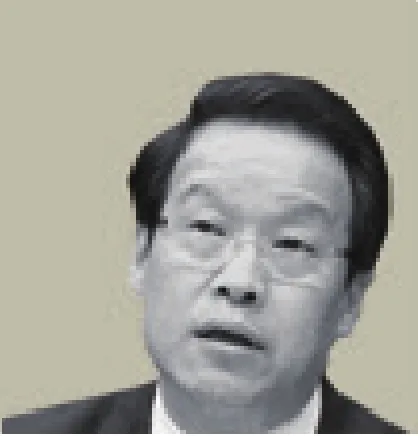PEOPLE&POINTS
2017-04-24
PEOPLE&POINTS
TOP INSURANCE REGULATOR PROBED
Xiang Junbo, Chairman of the China Insurance Regulatory Commission, is under investigation for suspected serious violation of the Communist Party of China’s code of conduct, according to an online statement by the Central Commission for Discipline Inspection of the Party on April 9.
Xiang, 60, concurrently served as a member of the monetary policy committee of the People’s Bank of China (PBOC), China’s central bank, since 2011.
He worked for the National Audit Office from 1996 to 2004 and became deputy auditor general of the office in 2002. He served as vice governor of the PBOC between 2004 and 2007. Later he became chairman of the Agricultural Bank of China, one of the fi ve large, state-owned commercial banks in China. He oversaw the joint-stock restructuring of the bank, which was listed in Shanghai and Hong Kong in 2010.

Tiered Reading For Children
Guangming DailyApril 10
Publishing companies should prominently mark the age group their books are suitable for, according to a draft guideline for promoting reading nationwide issued by the Legislative Affairs Office of the State Council. It also states that the State Administration of Press, Publication, Radio, Film and Television and educational authorities should promote a tiered reading system according to the physical and mental development stages of juveniles.
Many parents have faced difficulty choosing suitable reading materials for their children. They are bewildered by the wide array of books available and find it hard to make choices.
There have been repeated calls for introducing a tiered reading system for young people in recent years. For instance, a guideline for children’s development (2011-20) promulgated by the State Council in 2011 vowed to promote such a system by providing various age groups with suitable books and offering parents suggestions and guidance in selecting books for their children.
The key to promoting such a system is to treat reading as a spiritual enjoyment, rather than as a competition of intelligence. Such a system will prevent kindergarten children from reading middle school students’ books in order to excel.
Controlled by Food
China NewsweekApril 3
Eating disorders, a group of serious conditions related to persistent eating behaviors that negatively impact one’s health, emotions and ability to function in important areas of life, have been on the rise in China in recent years.
For instance, Peking University Sixth Hospital, one of the country’s top clinics for treating mental disorders, hospitalized 104 patients with eating disorders from 2001 to 2005, three times the number from 1993 to 2004. The number of hospitalized patients with eating disorders soared to 250 in 2015.
Eating disorders are often accompanied by other mental illnesses such as depression, obsessive-compulsive disorder and sleep disorders, adding to the difficulty of treatment. For instance, patients may refuse treatment by hiding the medicine.
As the only hospital that possesses a closed ward for eating disorders, Peking University Sixth Hospital has only 15 beds. The number of beds can be increased to a maximum of just over 20, but only female patients are allowed, as the ward was renovated from a women’s ward. There is also a lack of medical personnel. In China there are 1.49 psychiatrists for every 100,000 people on average. It takes fi ve to six years to train a psychiatrist specializing in eating disorders, and few are willing to take up such work.
Family-based therapy, which is popular abroad, may help solve the problem. Under the therapy, parents are encouraged to playa larger role in the treatment of their children and to cooperate with doctors to help children overcome the problem.
“When we decided to upgrade and modernize our subway system eight years ago, we picked CRRC, and they are doing a great job.”
Brian Shortsleeve, Chief Administrator of the Massachusetts Bay Transportation Authority (MBTA), in response to the recently unveiled mock-up of the MBTA’s new Orange Line trains made by CRRC, China’s leading train maker
“Access restriction is one of the major factors that constrain China’s private investment, especially in the energy and defense sectors.”
Li Wei, head of the Development Research Center of the State Council, commenting on April 10 on a media report saying that China will open up more industries, including oil drilling and defense technology, to private investors
“Anti-corruption theme is always popular since people in China despise graft.”
Su Wei, a professor at the Party School of the Chongqing Municipal Committee of the Communist Party of China, talking about the outspoken anti-corruption TV drama,In the Name of the People
“The growth of online retail channels has slowed compared with their rapid growth in the past, so they have to seek new business growth points.”
Lu Zhenwang, CEO of Shanghai-based Wanqing Consultancy, in response to a plan relesed on April 10 by China’s second largest e-commerce company JD.com Inc. to open over 1 million convenience stores nationwide in the next five years

Moreover, prevention is also crucial in curbing the rise of such conditions. Something should be done to change the obsession with a slim figure which has become popular since the 1960s the world over and which has partly contributed to the increasing number of eating disorder cases.
Empty-Nest Youth
China Youth DailyApril 12
There has been an increase in the number of so-called “empty-nest youth,” or young people who live alone, in China in recent years.
A survey of 2,000 Internet users conducted byChina Youth Dailyfound that lack of emotional support and bad living conditions are the two biggest problems affecting empty-nest youth, mostly new migrants in large cities. In addition, many of them are fi nancially stretched, live in narrow social circles, lack recreational activities and have limited social mobility.
The term “empty-nest” was originally applied to elderly people living alone after their children had grown up and moved away.
In fact, empty-nest youth is common worldwide. It’s the result of urbanization and an inevitable stage for young people to go through before getting married.
Empty-nest youth should learn to adjust themselves to reality rather than complain. For instance, they can try to fi ll their lives with interesting activities such as running, mountain climbing or watching fi lms. They can also work hard to improve their professional skills in order to gain promotions and pay rises.
In the meantime, the concerns of this group of people also deserve the attention of society. For instance, questions such as whether startups experience fair competition and whether they are covered by social security should be carefully looked into in order to provide a better social environment for young entrepreneurs.
NEW MEN’S TABLE TENNIS TEAM COACH

Qin Zhijian, who coached Grand Slam table tennis player Ma Long, was appointed new coach of China’s men’s table tennis team on April 6.
Qin took over the post from Liu Guoliang, head coach of the national table tennis team, who concurrently served as men’s team coach.
Born in Zhenjiang in east China’s Jiangsu Province in 1976, Qin started playing table tennis at the age of 6 and entered the national team in 1993. He won the mixed doubles title at the World Table Tennis Championships in 2001 with Yang Ying.
He retired in 2005 and later became a national team coach.
Qin said he faces huge pressure and major challenges in making the change from coaching a few players to heading an entire team. He will work with five other coaches under him. Together they form the youngest team of coaches in the history of China’s men’s table tennis team.
